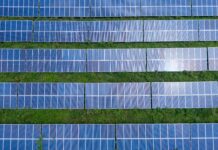Doug Young
Bottom line: Yingli’s use of crowd-funding to finance a small project and the bargain sale price of a small polysilicon maker reflect continuing struggles at second-tier solar companies and the need for more consolidation.
Two solar energy stories are showing how overcapacity continues to haunt the sector 2 years after it began to emerge from a major downturn. The first involves a desperate-looking fund-raising plan from the struggling Yingli (NYSE: YGE), which is trying to use crowd funding to pay for a new solar plant. The other news involves another slightly bizarre investment in the space, with Internet titan Tencent (HKEx: 700) and real estate giant Evergrande (HKEx: 3333) paying a bargain price for Mascotte (HKEx: 136), a money-losing Taiwanese maker of polysilicon, the main ingredient used to make solar panels.
Both of these deals look strange for different reasons that reflect the lingering state of turmoil in a solar panel sector plagued by excess capacity. Many of the weakest players have closed or been purchased over the last 2 years, with names like Suntech and LDK disappearing as independent companies. But a relatively large field of second-tier players like Yingli still remain in business and probably need to either close or get acquired before the industry can truly return to health.
Let’s start with Yingli, which proudly proclaims in its latest announcement that it is bringing solar financing to the masses by giving average people the chance to invest in a small new solar power plant. (company announcement) The plant is based in Yingli’s home province of Hebei, hinting that it used its local connections to get the project build. The plant has a modest capacity of 4 megawatts, and was funded with the sale of 20 million yuan ($3.2 million) in bonds.
Two Chinese companies provided the project’s original financing, but now it appears they want to sell their stake to average consumers via an online platform that resembles the popular crowd-funding model. The fact that these big investors are looking to sell their stake to unsophisticated consumers shows their own lack of confidence in the project, and the overall move really looks like desperation.
Yingli is the weakest of China’s major solar panel makers to survive the downturn so far, and this kind of move shows just how shaky its finances are. The company shocked investors in May when it said it was in danger of going out of business, even though it later said its statement was misinterpreted. (previous post) This kind of move to raise money through crowd-funding certainly won’t help to restore confidence in the company, and it’s still possible we could see Yingli ultimately fail this year or next.
Next there’s the other deal that has seen Tencent and Evergrande take a majority 75 percent stake of Mascotte for HK$750 million ($100 million). (company announcement; English article) The purchase price represents a whopping 97 percent discount to Mascotte’s last stock price before the announcement, which actually came last week.
A quick look at Mascotte’s latest financial statement, which was released after announcement of the Tencent and Evergrande investment, shows why the company so desperately needed the new money. Mascotte lost HK$129 million last year, which was actually an improvement over the $547 million it lost the previous year. Still, so many losses over consecutive years meant the company was probably out of funds and unable to find anyone to lend it new money to continue its operations.
The involvement of Tencent in this transaction looks a bit strange, as the company has never invested in this kind of new energy deal before. But that said, big tech names like Apple (Nasdaq: AAPL) and fast-rising online video firm LeTV (Shenzhen: 300104) seem to be suddenly piling into the space, perhaps as a form of public relations to show their commitment to environmental protection. Such investments have so far been quite small, and in this case Tencent won’t feel too much pain if Mascotte fails, which looks like a strong possibility over the next year or two.
Doug Young has lived and worked in China for 15 years, much of that as a journalist for Reuters writing about Chinese companies. He currently lives in Shanghai where he teaches financial journalism at Fudan University. He writes daily on his blog, Young´s China Business Blog, commenting on the latest developments at Chinese companies listed in the US, China and Hong Kong. He is also author of a new book about the media in China, The Party Line: How The Media Dictates Public Opinion in Modern China.






